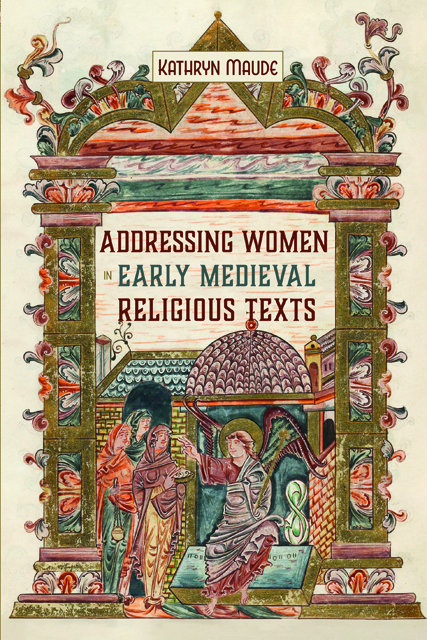Book contents
- Frontmatter
- Dedication
- Contents
- Acknowledgements
- Abbreviations
- Introduction: Behealde ge wif: Addressing Women in Early Medieval England and Scotland
- 1 Addressing Laywomen in Old English Sermons
- 2 Addressing the Recluse in Aelred’s De institutione inclusarum and Goscelin’s Liber confortatorius
- 3 Addressing Holy Women in the Life of Christina of Markyate and the Life of Margaret of Scotland
- 4 Addressing Nuns in Goscelin’s Hagiography for Wilton and Barking Abbeys
- Conclusion: Plebs ecclesiastice discipline: Addressing Women to Include and Exclude
- Bibliography
- Index
- Gender in the Middle Ages
Introduction: Behealde ge wif: Addressing Women in Early Medieval England and Scotland
Published online by Cambridge University Press: 14 January 2023
- Frontmatter
- Dedication
- Contents
- Acknowledgements
- Abbreviations
- Introduction: Behealde ge wif: Addressing Women in Early Medieval England and Scotland
- 1 Addressing Laywomen in Old English Sermons
- 2 Addressing the Recluse in Aelred’s De institutione inclusarum and Goscelin’s Liber confortatorius
- 3 Addressing Holy Women in the Life of Christina of Markyate and the Life of Margaret of Scotland
- 4 Addressing Nuns in Goscelin’s Hagiography for Wilton and Barking Abbeys
- Conclusion: Plebs ecclesiastice discipline: Addressing Women to Include and Exclude
- Bibliography
- Index
- Gender in the Middle Ages
Summary
In around 990, Ælfric of Eynsham wrote a homily for the Feast of the Purification of Mary bearing in mind his mixed congregation of monks, laymen and laywomen. In this homily, he tells his congregation about the widow Anna, who lived with a man for seven years and then remained a widow for eighty-four years. She loved fasting and prayer, and never left the temple to go wandering across the land. The story of Anna, Ælfric thought, had particular resonance for one part of his audience: ‘Behealde, ge wif, and understandað hu be hyre awriten is’ [‘Take heed, women, and understand what is written about her’]. Laywomen listeners, pay attention – this one’s for you.
Ælfric kept the women in his audience in mind when writing, and when he came across a particularly salient example for them, he took the time to draw their attention to it. He provided a script for these women’s lives, recognising their particular situation as Christian women and providing advice aimed specifically at them. Keeping this lay female audience in mind, though, we can question Ælfric’s knowledge of their lives and concerns. As a pious laywoman in Ælfric’s church, probably married to a man, what use is Ælfric’s advice to remain a widow? This advice leaves the woman with no other option than to wish her husband dead – can she not behave well as a Christian and be married? Was there no way for a married woman to be addressed as a Christian subject in her own right?
The moment of address in this sermon is an intimate knowledge claim that provides a script for women’s behaviour in the world. The laywoman is addressed directly and told to follow a particular exemplar. By looking at the forms of address in texts like this, we can locate the horizons of possibility for women’s lives as Christians – which possibilities are open to them, and which are closed. In some cases, the intimate knowledge claim succeeds – the address recognises women as full Christian subjects in their own right. In other cases, the intimate knowledge claim fails as it does not – perhaps cannot – recognise women’s experiences. For example, in this homily, Ælfric fails to imagine a married woman who can successfully operate as a Christian subject.
- Type
- Chapter
- Information
- Addressing Women in Early Medieval Religious Texts , pp. 1 - 14Publisher: Boydell & BrewerPrint publication year: 2021



